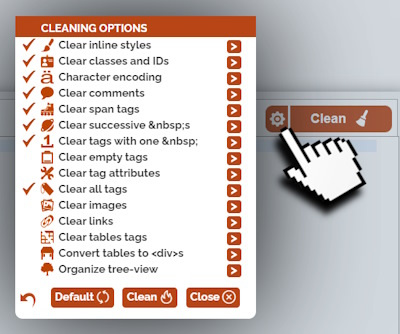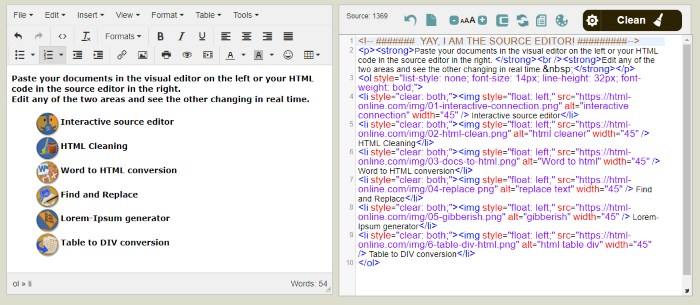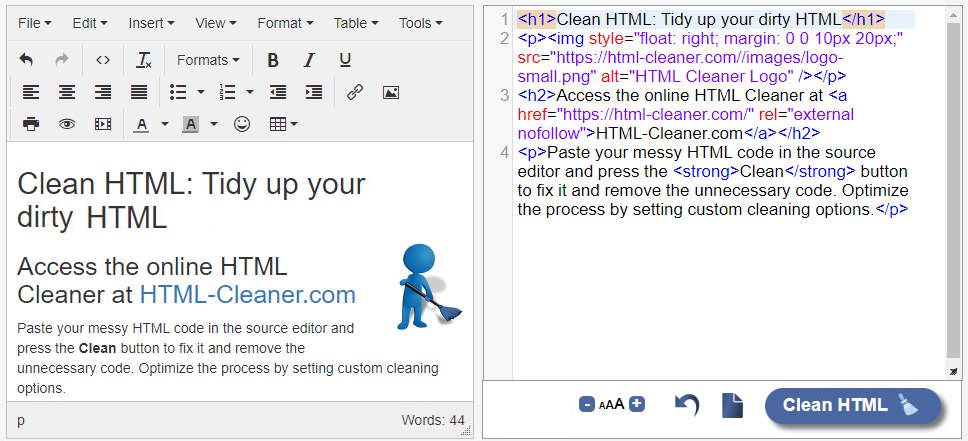HTML is the foundation of all webpages. It shapes web page structure and browser display. Writing HTML code seems easy at first, but doing it on a wide scale may be monotonous and time-consuming. Developers often write code for identical areas of a page, fix outdated or badly written code, or guarantee that everything follows the guidelines.
Handling this by hand may delay projects and increase errors. Custom software and automation help here. Custom tools for certain teams or organisations can simplify HTML creation and cleaning. This saves time and effort.

Our HTML editor’s cleaning options
Understanding the Challenges of Manual HTML Coding
Hand-coding HTML has some minor but noticeable issues. Developers writing code by hand✍🏻 must be mindful of closing tags, nesting, and formatting. If you make a mistake, the page may break or behave differently in browsers.
Repetition is another problem. Many websites reuse buttons, menus, and content blocks. Repeating code is repetitive and increases the likelihood of inconsistency. Writing one line differently could cause problems later.
Old code is as difficult to clean. Over time, websites accumulate unnecessary tags, inline styles, and lines. Removing all of this by hand takes patience and can lead to new problems.

This is why many modern companies, including Acropolium, have long been offering custom software development. With tailored solutions, teams can automate these routine tasks, focus on more creative work, and reduce the frustration that often comes with manual coding.
Why Automation Matters in Web Development
Automation in web development is more than just a way to save time. It also makes the procedure safer and more reliable✅️
When a machine does the same thing over and over, like formatting code or making a structure, the outcomes are always the same. Software tools don’t become tired or lose attention after working for a long time like people do.
For instance, automated systems can produce HTML for a group of web components in just a few seconds. They may use the same style and format on all of the pages, which keeps the code tidy and consistent. Automation also lowers the chance of making tiny mistakes that happen when people write things by hand.
Another key thing to remember is that automation offers developers greater room to be creative and solve problems. They can focus on design, usability, and other tasks that need human judgment instead of spending hours changing tags or replicating structures.
Role of Custom Software in Generating HTML Code
 There are existing generic tools for making HTML, but they don’t always work well. They are made for the typical person, thus they might not be exactly what a project needs. This is when specialised software really shines.
There are existing generic tools for making HTML, but they don’t always work well. They are made for the typical person, thus they might not be exactly what a project needs. This is when specialised software really shines.
You can make custom solutions that meet your particular needs. For instance, a business that makes a lot of landing pages would need a tool that makes HTML templates that are already set up with their own design criteria. Another team might need a generator that works with their CMS to make code from data that is already stored.
These tools only do what is really useful for the group they are made for. They don’t have any other features. So, developers get clean, well-structured HTML that fits the project’s demands from the start, with no further work.
Automating HTML Cleaning for Better Performance
Writing new code is only one part of the tale. A lot of websites have trouble with a lot of old or sloppy HTML. Not only is it monotonous to clean it by hand, but it’s also dangerous because eliminating the wrong line can break the whole site.
This process can be done automatically and safely with custom software. A cleaning🧹 tool may look over the code, find tags that aren’t being used, get rid of superfluous spaces, and solve nesting mistakes. It can also format everything in a way that is the same, which makes the code easier to read and work on.
Automated cleaning works better. A page with optimised code loads faster and opreates better on all kinds of devices. Websites become lighter and smoother when they get rid of things that aren’t needed. This makes the whole experience better for users.
Key Benefits of Custom Solutions Over Generic Tools
There are a lot of ready-made tools available, but they usually only work for one type of problem. There are a lot of evident benefits to making custom software.
- First, it lets you be flexible. Instead of adjusting their workflows to accommodate the technology, businesses may ask for tools that work with their workflows. This saves time and allows teams to work at their own pace.
- Second, you can make custom tools bigger. The software may expand with the projects as they get bigger. You can add new features or make changes to it to deal with new problems.
- Third, you can connect custom software to other systems. For instance, an HTML generator might connect directly to a company’s content platform, database, or design system. This makes it easier for multiple instruments to operate together and cuts down on the amount of labour that needs to be done by hand even more.
Finally, custom solutions help businesses that are different from each other’s needs. Every company is different, and a tool built specifically for one team will always deliver more value than a generic program designed for everyone.
Bottom Line
HTML powers the web, but hand-coding it may be slow, repetitive, and error-prone. Automation and custom software development improve these issues. With the correct tools, businesses can build structured code, clean up obsolete files, and maintain consistency without hours of human work.

Modern companies show that customised solutions are practical and valuable for teams looking to improve efficiency. If they adopt the right method, developers may spend less time resolving tags and more time creating fast, reliable, and engaging websites.
Custom software makes HTML automation operate better and last longer, allowing developers and businesses to create better digital goods with less work.


